Over 30 years of anarchist writing from Ireland listed under hundreds of topics
WSM’s Organisational Structures
This article from Red & Black Revolution 15 describes and explains the internal organizational structure of the WSM as it was in 2008. See the WSM Constitution to get an idea of any changes that may have been made since. This article was originally a box in the article Practical Anarchist Organising.
Practical Anarchist Organising - the WSM as a case study
Over the last few years, the Workers Solidarity Movement, the anarchist organisation that publishes this magazine, has grown considerably. We went from being an organisation with only a dozen members or so, to an organisation six times that size. As part of that growth we have had to reassess our internal workings and devise a range of new processes and structures for communicating, coordinating and democratic decision making. This article describes this process of change. It is hoped that it may serve as a useful case-study for other groups facing similar problems and as a small demonstration of the how anarchist organisational principles can be applied in practice.
Imperialism Today and the Emergence of Regional Powers
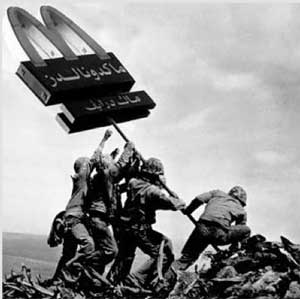 This articles charts the course of global geo-politics since the end of the Cold War, the emergence of new regional powers and the recurring cycle of crises in neoliberal capitalism that culminated in the great financial crisis of 2008.
This articles charts the course of global geo-politics since the end of the Cold War, the emergence of new regional powers and the recurring cycle of crises in neoliberal capitalism that culminated in the great financial crisis of 2008.
The historical development of the global financial order under US hegemony
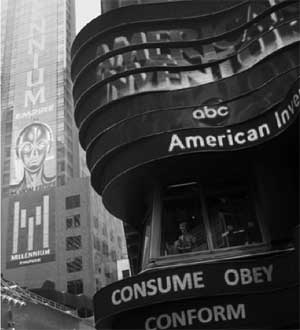 This article tells the story of the historical development of the regime of global financial order under US hegemony. It begins by examining how the centre of capital accumulation shifted from Europe to the US in the first half of the twentieth century, and how following World War II the global financial order became centred around the US through the Bretton Woods system. It then looks at how the Bretton Woods System was undermined, concentrating as much on the role of workers militancy as on the role of the Eurodollars market. After considering the response to the crisis of Bretton Woods, it concludes by looking at the Clinton boom, bringing us up to the current situation of the US’s current heavy dependence on foreign borrowing
This article tells the story of the historical development of the regime of global financial order under US hegemony. It begins by examining how the centre of capital accumulation shifted from Europe to the US in the first half of the twentieth century, and how following World War II the global financial order became centred around the US through the Bretton Woods system. It then looks at how the Bretton Woods System was undermined, concentrating as much on the role of workers militancy as on the role of the Eurodollars market. After considering the response to the crisis of Bretton Woods, it concludes by looking at the Clinton boom, bringing us up to the current situation of the US’s current heavy dependence on foreign borrowing
The Irish financial melt-down and popular resistance - interview with a WSM member
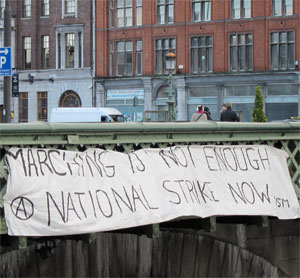 In this detailed interview for the North American Ideas & Action site Kevin Doyle of the Cork Branch of the Workers Solidarity Movement answers questions about the current Irish financial melt-down and the popular resistance. [Spanish translation]
In this detailed interview for the North American Ideas & Action site Kevin Doyle of the Cork Branch of the Workers Solidarity Movement answers questions about the current Irish financial melt-down and the popular resistance. [Spanish translation]
Dublin pro-choice rally marks ABC case
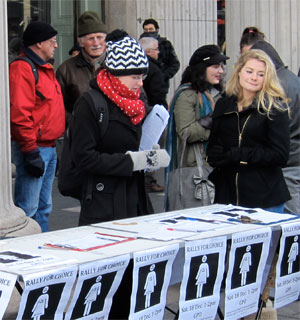 Saturday 18th December saw activists from a number of pro-choice organizations including the WSM rally at the GPO in Dublin to mark the European Court of Human Rights ruling in the ABC case. The short rally which took place in the bitter cold had been called at just over 24 hours notice by the Feminist Open Forum but still attracted a few dozen activists who have been involved in campaigning against Ireland's ban on abortion in the last decades.
Saturday 18th December saw activists from a number of pro-choice organizations including the WSM rally at the GPO in Dublin to mark the European Court of Human Rights ruling in the ABC case. The short rally which took place in the bitter cold had been called at just over 24 hours notice by the Feminist Open Forum but still attracted a few dozen activists who have been involved in campaigning against Ireland's ban on abortion in the last decades.
Understanding the roots of the crisis in Ireland - Bubble, Bailout and Backlash
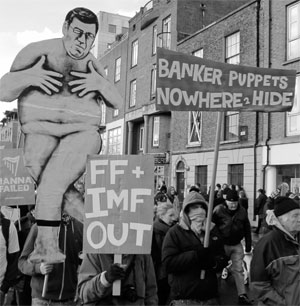 On Tuesday the 7th of December, the Irish government were barricaded inside the parliament in Dublin. They were there to vote on a Budget implementing the cutbacks and austerity measures demanded of them by the IMF and ECB. The budget comes in a year of ever deepening crisis, as the debt of what was once Europe's fastest growing economy, spiralled out of control. The obvious question one is faced with is “What went wrong? What happened to this economic miracle?
On Tuesday the 7th of December, the Irish government were barricaded inside the parliament in Dublin. They were there to vote on a Budget implementing the cutbacks and austerity measures demanded of them by the IMF and ECB. The budget comes in a year of ever deepening crisis, as the debt of what was once Europe's fastest growing economy, spiralled out of control. The obvious question one is faced with is “What went wrong? What happened to this economic miracle?
Travellers targetted by Limerick County Council
Limerick County Council has revived an old bylaw to enable it to seize caravans and cars belonging to Travellers. The move comes as hundreds of members of the families of Travellers who call Rathkeale home arrive for the Christmas break. This is an annual event that has been going on for years. Due to the lack of facilities families often end up camping on the roadside. This unavoibably causes tension with other local residents and road users. The county council has never made any serious effort to address the shortage of short term halting facilities in Rathkeale over the Christmas despite having fore knowledge of the problem.
Tragedy strikes Western Australia
The tragic deaths of at least 30 ‘asylum seekers’ at Christmas island of the coast in Western Australian is an indictment on an entire criminal system that condemns humanity to misery and enslavement in the interests of capital and statism.
Global Political Repercussions of the capitalist crisis
As soon as the scale of the crisis became clear, all rhetoric about free-markets and competition vanished. Bankers, capitalists and right wing politicians were all suddenly huge believers in the role of the state and the importance of regulation.

